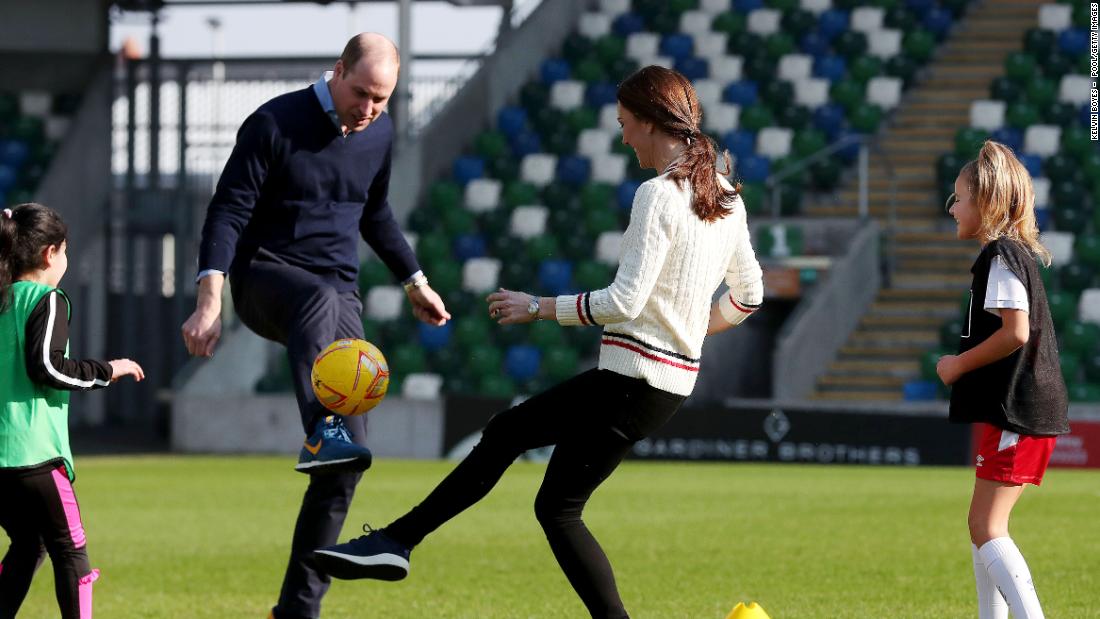Prince William: Football’s mental health approach a ‘dereliction of duty’

Speaking during a trip to Northern Ireland, where he visited the country’s Windsor Park national stadium, Prince William described the sport’s failure to fight the issue as a “dereliction of duty.”He pointed to clubs’ willingness to move players on without regard should they fail to make the grade, without considering the adverse effects the treatment could have on their individual well-being, leaving them without the necessary support to move on with their lives.”Some of these clubs don’t do anything about mental health,” Prince William said. “They pick a player up, he plays football, ‘no good,’ move on.”If we’ve got to change anything, we’ve got to change the whole way we look after players.”Many players come from difficult backgrounds and may have all sorts of issues going on.He added that clubs were often guilty of treating players as little more than “financial assets”, with young players “not given the key building blocks or support.”READ: Ex-footballer pushes for a “mental health revolution” after multiple suicide attemptsA 2015 study organized by the World Players’ Union FIFPro showed that 38% of players and 35% of former players reported from suffering from symptoms of depression and/or anxiety.The FIFPro study also found that professional footballers who had sustained three or more severe injuries during their career were two to nearly four times more likely to report mental health problems than those who had not suffered from severe injuries.Visit CNN.com/sport for more news, features and videos’Resilience has to be built’Prince William also highlighted the dilemma caused by the culture of protection afforded to young players, questioning whether a “win-win” approach in youth sport fails to prepare athletes for disappointment.He asked: “Are we setting up some of our children at the moment for more mental health issues in the future, by the way we are creating a win-win situation and scenarios?”Because resilience has to be built within everybody. “From a very, very young age, nobody wants to be told they’re not good at something but of course that could prove a difficult situation to handle when life comes along with school and jobs and so on.READ: Julie Ertz: Winning the World Cup and being part of sport’s ‘power couple'”How do they learn to pick themselves back up again?”When they lose a match, you’re gutted. But that’s part of what sport is all about. Every sportsman and woman knows what it takes to be at the top of their game.”In October 2018, England’s Professional Footballers’ Association (PFA) reportedly received a record number of approaches from players for support with mental health problems. While 160 cases were documented in 2016, the total reached 403 in 2017, with 312 reported by the end of August 2018.At the time, the body’s head of welfare, Michael Bennett, stressed that the increase did, at least, show a growing understanding of the issue and of the help that exists.”The statistics may sound worrying when you first hear them but they’ve got to be interpreted as a positive,” he said.In addition, to the work of the PFA, the English Football League (EFL), which runs the three divisions outside the Premier League, is working in partnership with the mental health charity, Mind. As part of the arrangement, Mind’s logo has appeared on the back of all 72 EFL teams’ shirts this season.Former Liverpool and England striker Stan Collymore, who has previously spoken out against his own battles with depression, praised the Duke’s comments in a column in the UK’s Daily Mirror newspaper.He called the words “potentially game-changing for the way mental health issues are dealt with in football,” given his global platform as the second in line to the throne.Neither the Premier League nor the EFL were immediately available for comment in providing a response to Prince William’s comments.






